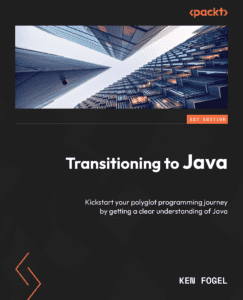Ken Fogel is the author of Transitioning to Java; we got the chance to sit down and find out more about his experience of writing with Packt.
Q: What are your specialist tech areas?
Ken: College instructor for 31 years in Computer Science, 20 of those years teaching Java.
Q: How did you become an author for Packt? Tell us about your journey. What was your motivation for writing this book?
Ken: Upon my retirement from the classroom in 2021, I looked for an opportunity to share what I know and my experience as a teacher in a book. In approaching publishers, Packt was the most interested in what I wanted to write.
Q: What kind of research did you do, and how long did you spend researching before beginning the book?
Ken: I already had a good sense of what needed to be covered in the book but I knew that some of my knowledge was out of date. As each chapter was written, I reviewed writings on the topic on the internet to ensure that I was presenting the current standards.
Q: Did you face any challenges during the writing process? How did you overcome them?
Ken: I found myself writing far more than I first predicted. Frequently, I needed to cut back on my writing so that the concepts that I was presenting did not get lost in excessive verbiage.
Q: What’s your take on the technologies discussed in the book? Where do you see these technologies heading in the future?
Ken: Java is already established as the primary language of enterprise, server-side, programming. It has been accused of being verbose with many decorations that must be in the code whether you understand why or not. Java is changing to deal with this. Very soon you will be able to write programs without much of what is required today. This will make the teaching of Java much easier and allow Java to be used for simple tasks. For enterprise and desktop applications, new features are coming down the pipeline that will improve Java’s performance and improve Java’s interaction with programs written in other languages.
Q: Why should readers choose this book over others already on the market? How would you differentiate your book from its competition?
Ken: My first book tries to get to the point of a topic quickly. Readers are expected to be programmers who are unfamiliar with Java. There are numerous code examples that a reader can start with and expand upon. I believe that my book is different from others as it gets to the point of each topic quickly and with a focused code example.
Q: What are the key takeaways you want readers to come away with from the book?
Ken: The versatility of Java. The book presents both desktop and server-side coding in Java. Java is not tied to an OS and programs in Java can run on multiple platforms without any changes. Java is evolving rapidly while still supporting code written 20 years ago.
Q. What advice would you give to readers learning tech? Do you have any top tips?
Ken: As readers are expected to be programmers, the most important advice is to run the code samples, tinker with them, and explore what Java can do.
Q. Do you have a blog that readers can follow?
Ken: www.omnijava.com
Q: Can you share any blogs, websites, and forums to help readers gain a holistic view of the tech they are learning? What are the key takeaways you want readers to come away with from the book?
Ken: A good place to start is https://dev.java/
Q. How would you describe your author’s journey with Packt? Would you recommend Packt to aspiring authors?
Ken: My experience with Packt was nothing less than excellent. The book evolved during the writing with additional chapters and when I made my case for the changes, Packt was always supportive. I learned a lot about professional writing from the editorial suggestions. I hope to work with Packt again.
Q. Do you belong to any tech community groups?
Ken: I am a Java Champion and a member of the Java Community Process Executive Committee. I also organize an annual online JChampions Conference.
Q. What are your favorite tech journals? How do you keep yourself up to date on tech?
Ken: While I primarily get my information from blogs from developers I admire, the one journal to follow is the Java Magazine https://blogs.oracle.com/javamagazine/
Q. How did you organize, plan, and prioritize your work and write the book?
Ken: Being a retired teacher, I certainly had the time to write the book. Even so, it took longer than was expected. I began with the outline of the book, an outline that evolved. For each topic, I looked at how it was discussed on numerous web sites. I created a list of topics for the chapter and then addressed each one in text and sample code.
Q. What is that one writing tip that you found most crucial and would like to share with aspiring authors?
Ken: I have prepared written material for students and I tried to apply what I learned from that experience. Get to point as quickly as possible. Keep explanations simple, you do not want to intimidate your reader by presenting complex solution to simple problems. You do not need to prove that you are smarter than the reader, they already know that.
Q. Would you like to share your social handles? If so, please share.
Ken: LinkedIn, Twitter, Mastodon
You can find Ken’s book on Amazon by following this link: Please click here

Transitioning to Java is available on Amazon.com









